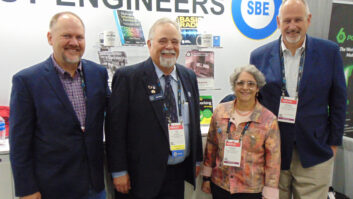Guy Wire is the pseudonym of a veteran broadcast engineer.
Radio has faced enormous changes over the entire past decade as we’ve been forced to adapt to a shrinking share of audience and revenue. All of our brothers engaged in legacy electronic media entertainment are dealing with the same challenge.
Radio is very much a monkey-see, monkey-do business. Most try to follow the lead of those who have figured out how to play the game of growing bigger and more powerful.

iStockphoto/MHJ
For better or for worse, those operators have vastly refined and streamlined the art of consolidation. We’ve all seen the slow erosion of local control and decision-making power. Corporate or regional managers are making more and more of the day-to-day decisions traditionally handled by local station GMs. In fact, increasing numbers of stations no longer even fill that position. I’ll talk more about this unsettling new trend in my next column.
Technology advances have in part enabled this, with a myriad of other new efficiencies across all markets. They’ve been used to slash expenses and reduce staffing to the bare minimum, keeping the loyal employees who are the most capable and willing to work multiple roles.
It’s not uncommon to walk into most group-owned station cluster operations at night or over the weekend and see no sign of human life, save for one minimum wage board op supposedly watching everything. Phone calls into any of the stations get answered by clever interactive voice-mail systems that allow the caller to talk with a robot instead of a live person.
OUTSOURCED ENGINEERS
Technical operations have been massively consolidated. Many stations in even larger markets don’t have a full-time chief engineer, let alone an engineering staff anymore. Transmitter site and IT support are contracted; a regional engineer or his assistants visit their area stations to put out fires once a week or as necessary.
Most IT operations have been centralized at a corporate headquarters location. The corporate staff picks the platforms and manages the email, financial, traffic, billing and other functions for their entire company.
They also pick the music scheduling and automation systems. Owned-and-operated stations are tethered to corporate via a big data pipe, and they heavily depend on that WAN connection for most of their day-to-day operations. The majority of many group-owned stations’ live programming is not only coming off satellites, but increasingly even the local bits feed out of corporate servers over the WAN from hundreds or even thousands of miles away.
More station groups are finding they can operate and maintain most of the local station IT infrastructure remotely via the pipe. It’s only when a router, server or manager’s workstation crashes do they need some kind of local intervention or support. With software and hardware platforms supposedly becoming more reliable, many managers have decided crashes don’t happen often enough to justify retaining local IT staff employees.
Things get a little more dicey when it comes to the local digital delivery and automation IT operations. When these systems crash or act up, a hot standby system better be ready to swing into action or a lot of off-air time and lost revenue can result.
This is where a nearby regional engineer or contractor must respond as quickly as possible. The same applies to supporting the transmitter operations. Internet streams may still be online, but the audiences served by them are still miniscule compared to those using traditional over the air delivery. And that’s going to be the reality for quite a while.
CONTRACTORS RULE
Contractors have stepped up to serve the technical needs of many stations, especially those in the small markets. And they are increasingly used for RF and transmitter site support in markets of all sizes.
As a group, these folks are among the best and brightest at what they do for our industry. Almost every successful broadcast contractor has paid his dues working as a full-time CE. Having done contractor duty myself in a former life, I can attest that working for yourself and multiple employers has many advantages, but it’s not for everybody.
Contractors usually will respond to their best clients first when emergency calls come in simultaneously. The others have to wait their turn, depending on their contracts and what they are willing to pay for.
Station managers generally want to hire and retain the most competent and loyal employees they can find for their mission-critical departments. The risk of losing thousands of dollars of missed commercial inventory because of technical glitches or human error is just too great.
A RISKY BUSINESS
But too many stations have turned to contractors for all of their technical support needs because of budget constraints. They find themselves at the mercy of the quality and competence of the best available contractors they can afford.
If they’ve decided to forgo full-time employees who would always be watching their technical operations as their No. 1 priority, then they live with the consequences. The willingness to do this is driven largely by market size and station profitability. The stations on the edge that struggle to meet budgets and payroll every month have limited choices in the matter.
But many profitable stations have chosen contractors or part-time technical support over full-time engineers as a calculated risk. Managers and owners usually are non-technical and are so focused on sales and programming, they too often ignore technical issues and only deal with them when crises occur. It usually only takes one very expensive off-air outage, or a big FCC violation and fine, to change their minds on this score.
WHAT ABOUT ME?
So where does this ongoing transformation of our business leave the station engineer who’s been toiling in the trenches for perhaps decades? We’ve been worrying a long time about where the next generation of broadcast engineers will be coming from. How are all the “gray hairs” who are retiring or leaving the business going to be replaced?
If you’re still employed full-time and handling a cluster of stations, count yourself as one of a dwindling group of lucky souls. You still have a job because your manager believes in the value of technical support and has full confidence in your ability. He probably has to defend keeping you whenever challenged by a corporate manager about further downsizing or outsourcing part or even all of his cluster’s engineering.
But at some point in the not-too-distant future, he may not be able to keep doing that. The corporate conversation with the GM (if there still is a local GM) will go something like this: “How much can you save if you replace all the functions that your engineer(s) provide with contracted outside support plus our regional guy? I’ll let you take home a piece of the difference.” The GM has to think about that.
If most of what you do is limited to studio equipment maintenance, transmitter maintenance or doing remotes, those functions are prime candidates for a cheaper contractor. After all, with the reliability of modern equipment and the support of a corporate regional engineer for the big projects and big emergencies, full-time staff engineers who do maintenance might be dispensable.
On the other hand, if you provide additional support beyond traditional engineering and are a go-to guy for IT, automation systems issues and/or other technical systems around the plant, then it becomes more expensive for the GM to replace all those functions with contractors. He would be giving up the full-time employee who would be on the premises every day and via a 24/7 electronic tether.
Most smart managers and owners have thought this through. Most will likely keep the employees who have served them best and who are willing to continue doing that. But the pressure to keep downsizing seems unrelenting.
Managers everywhere need to reassess the risks they are contemplating by depending too heavily on outsourcing and contractors. Competent fulltime engineers know how to save their stations tons of money and grief in the long-run and can usually prevent crises before they strike. But if the current trends continue, it’s looking like our industry isn’t going to need nearly as many replacement engineers as we once thought.
Read past articles under the Columns tab.
Comment on this or any story. Write to [email protected].












